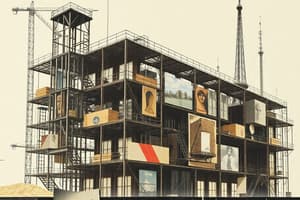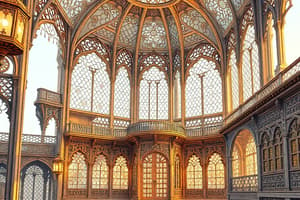Podcast
Questions and Answers
What can vertical linear elements do in an urban space?
What can vertical linear elements do in an urban space?
- Provide a sense of enclosure
- Create a negative space above it
- Establish a field of space with no visual continuity
- Terminate an axis, mark the center of an urban space, or provide a focus for an urban space along its edge (correct)
What is a characteristic of a vertical linear element?
What is a characteristic of a vertical linear element?
- It always provides a sense of enclosure
- It can terminate an axis or mark the center of an urban space (correct)
- It is always a single vertical plane
- It never permits visual continuity
What can a vertical element do to a spatial volume?
What can a vertical element do to a spatial volume?
- Define its edges while permitting visual and spatial continuity (correct)
- Create a single spatial field
- Define its edges while obstructing visual continuity
- Divide a space into two separate fields
What can a series of vertical linear elements form?
What can a series of vertical linear elements form?
What is a characteristic of a regular spaced series of columns?
What is a characteristic of a regular spaced series of columns?
What can a single vertical plane do to a space?
What can a single vertical plane do to a space?
What can two vertical planes establish?
What can two vertical planes establish?
What is necessary for a plane to define a three-dimensional volume of space?
What is necessary for a plane to define a three-dimensional volume of space?
What is the concept that highlights the interdependence of form and space in architecture?
What is the concept that highlights the interdependence of form and space in architecture?
What type of elements serve as containers that define volumes of space?
What type of elements serve as containers that define volumes of space?
What is necessary for a horizontal plane to be seen as a figure?
What is necessary for a horizontal plane to be seen as a figure?
What is the effect of a stronger edge definition of a horizontal plane?
What is the effect of a stronger edge definition of a horizontal plane?
What type of elements define the volume of space surrounding an architectural form?
What type of elements define the volume of space surrounding an architectural form?
What is the term used to describe the concept of building forms serving as containers that define volumes of space?
What is the term used to describe the concept of building forms serving as containers that define volumes of space?
What is an example of a space-defining element?
What is an example of a space-defining element?
What is the term used to describe the Unity of Opposites in architecture?
What is the term used to describe the Unity of Opposites in architecture?
What is the primary characteristic of an L-Shaped plane?
What is the primary characteristic of an L-Shaped plane?
Which of the following is a characteristic of a space defined by parallel planes?
Which of the following is a characteristic of a space defined by parallel planes?
What is the effect of introducing a void on one side of the corner of an L-Shaped plane?
What is the effect of introducing a void on one side of the corner of an L-Shaped plane?
What is the primary difference between a U-Shaped plane and the other three planes?
What is the primary difference between a U-Shaped plane and the other three planes?
Which type of space is naturally suited for parallel planes?
Which type of space is naturally suited for parallel planes?
What is the effect of opening one or both of the parallel planes?
What is the effect of opening one or both of the parallel planes?
How can an L-Shaped plane be used in building design?
How can an L-Shaped plane be used in building design?
What is the nature of the space defined by parallel planes?
What is the nature of the space defined by parallel planes?
Flashcards are hidden until you start studying
Study Notes
Overhead Plane
- The overhead plane is a major space-defining element in a building, determined by the material, geometry, and proportions of its structural system.
- It can visually organize a series of forms and spaces beneath its sheltering canopy.
- Well-defined negative areas or voids within an overall plane, such as skylights, can be seen as positive shapes that establish the presence of spatial fields below the open roof.
Space Defining Elements
- Vertical elements:
- Can terminate an axis, mark the center of an urban space, or provide a focus for an urban space along its edge.
- Can define a transparent volume of spaces.
- Can mark the corner of a platform and establish a field of space – a three-dimensional framework.
- Horizontal elements:
- Base plane: a horizontal plane on a contrasting background defines a simple field of space within a larger context.
- Elevated base plane, depressed base plane, and overhead plane.
Vertical Elements
- Single vertical plane:
- Provides little or no sense of enclosure.
- Can separate one space from another and provide a good sense of enclosure.
- L-shaped plane:
- Defines a field of space along a diagonal from its corner outward.
- Can be used in combination with other elements to define rich varieties of spaces.
- Parallel planes:
- Define the volume of space in between that is oriented axially towards the open end.
- Give the space a strong directional quality.
- U-shaped plane:
- Defines the volume that is primarily oriented towards the open end.
- The open end of U-shaped configuration creates uniqueness relative to the other three planes.
Form and Space
- Form and space are inseparable realities that together form the reality of architecture.
- Spatial relationships and formal relationships are two sides of the same coin, as altering one will inevitably affect the other.
- Examples of buildings that demonstrate the unity of opposites include:
- Studio Daniel Libeskind: Connecticut home
- Robert Bruno: Steel House
- Coop-Himmelb(l)au: Pavilion 21 Mini Opera Space
- Herzog & de Meuron: Vitra Hausi
Studying That Suits You
Use AI to generate personalized quizzes and flashcards to suit your learning preferences.




